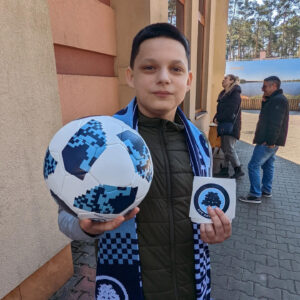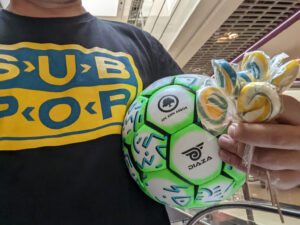Score!
As the Russia-Ukraine war developed, Michal Lorenc found an unexpected calling, reuniting him with his birthplace in Lublin, Poland, to bring joy to its most vulnerable — the children.
Lorenc, clinical assistant professor of sport management in the School of Kinesiology, transitioned from a 20-year career at Google, where he led the digital transformation of sports and live entertainment, to full-time teaching this fall.
What was meant to be a couple years in Ann Arbor is now going on 17 as Lorenc fell in love with the Midwest college town atmosphere.
“Going back to academia was always a plan. After spending so much time in industry, you reflect on how to mentor others. How do you give back?” he says.
This transition signified not just a career shift but a monumental change in Lorenc’s life purpose and impact. His journey began when he decided to assist Ukrainian refugees in the ongoing conflict with Russia.

Bohdam, a 13-year-old refugee who insisted on helping unload Michal Lorenc’s truck, was rewarded with a scarf and soccer ball. (Photo by Michal Lorenc)
Kicking and smiling
On his first trip back to Lublin, Lorenc focused on helping Ukrainian refugee kids. He brought soccer balls and scarfs to the country from his affiliation with the Association Football Club Ann Arbor, a local semiprofessional soccer club.
After giving away the soccer balls and scarves, “I saw first-hand the impact that a simple soccer ball can have on the kids. They were smiling and kicking the ball,” he says.
Lorenc recounts one memorable experience with Bohdam, a 13-year-old who insisted on helping him unload his truck.
“I had a scarf and soccer ball, so I gave it to him, and he literally hugged me, he was so happy,” Lorenc says.
This initial gesture was so impactful that Lorenc decided he had to put more balls in the hands of more children.
Over the course of 2022 and several trips back to Poland, he dedicated three months of his life to helping refugees, establishing a connection with Diaza, a soccer ball manufacturer in Pakistan. Much of the coordination and connections were established while in the United States.
The idea was simple and powerful, but with challenges.
Finding a producer came first, then the logistical part of shipping 5,000 soccer balls from Pakistan, where they were manufactured, to Poland.
“Luckily, Diaza was gracious enough to design and handle the logistics and coordination of the soccer balls, but the question was, who is going to pay for the taxes and tolls?” Lorenc says. “I ended up paying for it out of pocket.
“I had no idea how much red tape we had to go through just to receive and distribute.”

Soccer balls and blue and yellow lollipops, the colors of the Ukrainian flag, brought joy to the Ukrainian refugee children. (Photo by Michal Lorenc)
Partnerships involving local professional soccer clubs and government entities led to a three-site distribution endeavor — Lublin and Kielce in Poland, and Vinnytsia in Ukraine. With Lublin as homebase, dozens of activities for kids were organized alongside the distribution of the soccer balls in the summer of 2023, leading into the fall.
The event launched with a half-day soccer camp at Motor Lublin Club in collaboration with the first division soccer club. Both boys and girls got to play soccer and practice at the facility.
“There were a couple of kids who were very good, and the club was really interested in bringing those kids to join their youth soccer team,” Lorenc says.
Mothers reported this was the first time they heard their kids laugh, momentarily forgetting the horrors of the war.
Ongoing effort
The impact of the soccer ball distribution wasn’t just about giving away the balls; it was about integrating the children into a more comprehensive experience, Lorenc says. Each child also received two wristbands in the colors of the Ukrainian flag.
While the soccer balls brought momentary joy to the children, it was the experience of interacting with them and their families that left an enduring impact on the kinesiology professor.
“I felt very privileged in being able to take time off work, tap into my network, and have my friends, family, and colleagues donate,” Lorenc says. “I realized that actually meeting with and talking to somebody, to look them in the eyes, that your help is much more meaningful than just a simple anonymous donation.”
As he looks to the future, Lorenc recognizes the evolving needs of the nation’s refugees and envisions a long-term initiative that includes supporting the rebuilding of Ukraine. He hopes to create modern sports facilities in eastern Ukraine, allowing its citizens to embrace the values of freedom and unity.
(Lead image: Mike Lorenc at the Help Ukraine Center in Poland.)



